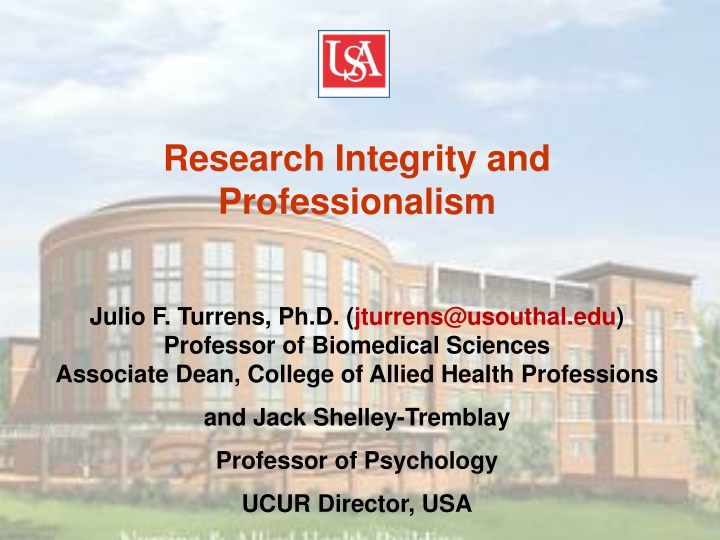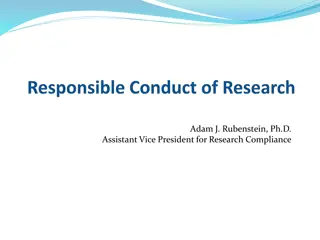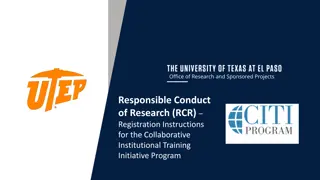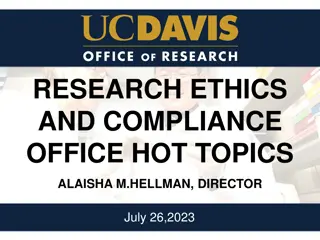
Professionalism and Ethics in Research: Importance and Training Areas
Discover the significance of professionalism and ethics in research, emphasizing the need for training in Responsible Conduct in Research (RCR). Explore the history of ethical lapses in human subjects research and learn about suggested training areas for upholding research integrity.
Download Presentation

Please find below an Image/Link to download the presentation.
The content on the website is provided AS IS for your information and personal use only. It may not be sold, licensed, or shared on other websites without obtaining consent from the author. If you encounter any issues during the download, it is possible that the publisher has removed the file from their server.
You are allowed to download the files provided on this website for personal or commercial use, subject to the condition that they are used lawfully. All files are the property of their respective owners.
The content on the website is provided AS IS for your information and personal use only. It may not be sold, licensed, or shared on other websites without obtaining consent from the author.
E N D
Presentation Transcript
Research Integrity and Professionalism Julio F. Turrens, Ph.D. (jturrens@usouthal.edu) Professor of Biomedical Sciences Associate Dean, College of Allied Health Professions and Jack Shelley-Tremblay Professor of Psychology UCUR Director, USA
What is the difference between a profession and an occupation?
Professions usually involve Higher education In depth knowledge within a discipline Code of ethics Rules and codes important for the discipline (Engineering, Business, etc.)
Why do we stress training in RCR, ethics and professionalism? For many years, we assumed that academicians could do no wrong. Basic research did not need regulations. With time, it became apparent that, even when their motivations were unquestionable, scientists performed studies that unintentionally (or not) hurt people, animals and even colleagues.
Human Subjects Research 1940-45 1963-66 Willowbrook Hepatitis Experiments 1932-72 Tuskegee Syphilis Study Nazi Germany Experiments Ethics in Art? In History? In Anthropology?
Professional Ethics and Professionalism Researchers, like other professionals, needed rules and principles that are essential for the progress of research in all areas.
Suggested training areas concerning Responsible Conduct in Research in health Sciences Data Acquisition, Management, Sharing and Ownership Conflict of Interest and Commitment Human Subjects Animal Welfare Research Misconduct Publication Practices and Responsible Authorship Mentor / Trainee Responsibilities Peer Review Collaborative Science
There is a difference between inadvertently making mistakes and purposely falsifying or making up data: The first one is sloppy research while the second one is lying intended to mislead colleagues
RCR and ethics in research Often researchers need to make decisions that are ethical in nature. You will discuss some examples in small groups. Discrepancies in ethics are a result of the complexity of the process which involves three components: Person Action Outcome Wm. David Solomon: Ethics: normative ethical Theories from The Encyclopedia of Bioethics (New York, Macmillan Pub. Co., 1995)
The Ethical Decision Making Processes Risks? What types? Physical Intra-personal Inter-personal Financial Ethical/Moral To Whom? Subject of study, Researcher, Institution, Society Risk/Benefit Ratio Risk Benefit



